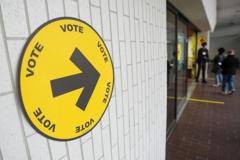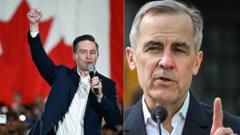Today, Canadians are participating in key parliamentary elections that could shift their political landscape.
Canadians Head to the Polls Amid U.S. Concerns

Canadians Head to the Polls Amid U.S. Concerns
Canadians are voting today in an election that reflects deeper fears about U.S.-Canada relations.
Canadians are heading to the polls to select their government leadership amidst concerns largely influenced by U.S. politics and President Trump's tenure. The election pits Prime Minister Mark Carney of the Liberal Party—known for his background in international banking—against Conservative leader Pierre Poilievre, a seasoned political figure. With the economy under strain from U.S. tariffs, many Canadian voters find themselves grappling with dual concerns: economic uncertainty linked to trade with the U.S. and political anxiety driven by Trump’s controversial remarks about Canada.
As Matina Stevis-Gridneff, the Canada bureau chief points out, economic issues dominate this election. Tariffs imposed by the U.S. have sparked frustration among Canadians, prompting a desire for accountability directed at the ruling Liberal Party, which has held power for the past decade. The Conservatives are positioning themselves as a party of change, advocating for reduced government intervention, tax cuts, and deregulation.
However, there is a significant segment of voters primarily worried about national sovereignty and the implications of U.S. policies on Canadian autonomy. This group sees Carney's experience in economic crises as essential and leans towards the Liberal Party. Carney’s leadership is viewed as a stabilizing force during tumultuous times, especially when faced with the prospect of annexation discussed by Trump.
The outcomes of this election will not only determine Canada’s political direction but will also signal how Canadians wish to respond to U.S. pressures—balancing economic concerns with the imperative of national identity. As Canadians make their choices today, the looming shadow of U.S. influence remains at the forefront of their minds.
As Matina Stevis-Gridneff, the Canada bureau chief points out, economic issues dominate this election. Tariffs imposed by the U.S. have sparked frustration among Canadians, prompting a desire for accountability directed at the ruling Liberal Party, which has held power for the past decade. The Conservatives are positioning themselves as a party of change, advocating for reduced government intervention, tax cuts, and deregulation.
However, there is a significant segment of voters primarily worried about national sovereignty and the implications of U.S. policies on Canadian autonomy. This group sees Carney's experience in economic crises as essential and leans towards the Liberal Party. Carney’s leadership is viewed as a stabilizing force during tumultuous times, especially when faced with the prospect of annexation discussed by Trump.
The outcomes of this election will not only determine Canada’s political direction but will also signal how Canadians wish to respond to U.S. pressures—balancing economic concerns with the imperative of national identity. As Canadians make their choices today, the looming shadow of U.S. influence remains at the forefront of their minds.























